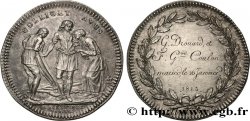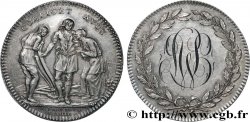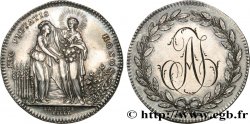E-auction 300-219355 - fjt_499078 - NORMANDY (GENTRY AND TOWNS OF...) Jeton Ar 28, prieur et juges-consuls de Dieppe 1762
You must signin and be an approved bidder to bid, LOGIN TO BID. Accounts are subject to approval and the approval process takes place within 48 hours. Do not wait until the day a sale closes to register. Clicking on « bid » constitutes acceptance of the terms of use of cgb.fr private e-auctions.
Bids must be placed in whole Euro amounts only. The sale will start closing at the time stated on the item description; any bids received at the site after the closing time will not be executed. Transmission times may vary and bids could be rejected if you wait until the last second. For further information ckeck the E-auctions F.A.Q.
NO BUYER'S FEE.
NO BUYER'S FEE.
| Estimate : | 45 € |
| Price : | 36 € |
| Maximum bid : | 36 € |
| End of the sale : | 14 January 2019 18:19:00 |
| bidders : | 6 bidders |
Type : Jeton Ar 28, prieur et juges-consuls de Dieppe
Date: 1762
Metal : silver
Diameter : 28 mm
Orientation dies : 6 h.
Weight : 8,35 g.
Edge : cannelée
Catalogue references :
Obverse
Obverse legend : LUD. XV. REX. - CHRISTIANISS..
Obverse description : Buste lauré et drapé à droite de Louis XV [n° 342] ; au-dessous signature R. FIL. .
Obverse translation : (Louis XV, roi très chrétien).
Reverse
Reverse legend : CIVICO. FŒDERE PRODERIT ; À L'EXERGUE EN DEUX LIGNES : ÆDIL. DEPPÆ COMIT./ 1762.
Reverse description : Écu aux armes de Dieppe sur un cartouche surmonté d’une tête d’ange et soutenu par deux Néréides ; signature D. V..
Reverse translation : (Elle sera utile à l'alliance civile - Assemblée des notables de Dieppe).
Commentary
Les juridictions consulaires remontent à Henri II. Dans ces lieux de réunions, les marchands élisent entre eux un prieur et deux juges-consuls qui règlent en première instance les problèmes entre négociants. Les juges-consuls ou juges des tribunaux de commerce sont établis par un édit de 1563. Ils étaient souvent d’anciens consuls (officiers municipaux) d’où leur nom. Au XVIIIe siècle, les juges-consuls jugeaient souverainement jusqu’à 500 livres (au-delà, l’affaire relevait des Parlements).








 Report a mistake
Report a mistake Print the page
Print the page Share my selection
Share my selection Ask a question
Ask a question Consign / sell
Consign / sell
 Full data
Full data



